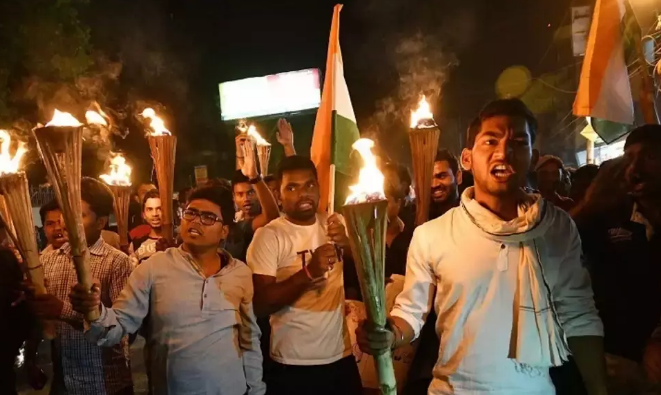Aftermath of Bharat Bandh Violence in MP: Boycott of Dalits By Upper Castes, Dalits Apply For Gun Licenses

Image Courtesy: Times Of India
[Newsclick travelled through the Chambal region, one of the most backward regions in Madhya Pradesh, to find out the condition of people and major issues facing them. This is Part 1 of a series of reports from Chambal.]
Gwalior/ Morena/ Bhind: The majority of the population of Galla-Kothar and Bhim Nagar, located on the outskirts of Gwalior, comprises Dalits, while the upper castes (mostly Thakur) are in minority. These two places were the epicentre of the April 2 violence last year where two persons, Deepak and Rajesh, were killed during the alleged violence by the upper caste men. In the vicinity of Gall-Kothar and Bhim Nagar, the caste lines have now become discernible.
Mohan Jatav, who runs a tea stall in Galla-Kothar, said, “Before the incident, my tea would go to almost every shop of the upper caste men (Thakurs), but now, they have started boycotting me, or the tea shops run by Dalits.”
Another resident, Mahendra Jatav said, “They also avoid employing us for work like farming, construction and mining. We are forced to migrate, or look for other ways to earn.”
Local Dalit shop owners claimed that their sales have been dropped since the incident.
Similarly, in Uttampura and Singal, situated on the either side of the railway track in Morena and Bhind’s Mehgaonm there is a huge impact of the incident.
After Bharat Bandh protests on April 2, 2018, and subsequent deaths of seven people in the violence, including five Dalits in Gwalior-Chambal region of Madhya Pradesh, the region has been divided.
The violence has left massive social and psychological impact on the people from either caste. As a result, the upper caste men are now reportedly refraining from taking part in the family functions or marriages in the Dalit families.
In retaliation, shockingly, the residents of the Dalit colonies, which were attacked on April 2, have reportedly applied to get gun or mauser license for the sake of their protection.
The divide is apparent mostly in the vicinity of the area where the violence had erupted.
On January 1, 2019, a group of upper caste youths had allegedly attacked a Dalit youth because he was wearing an expensive gold bracelet.
Recounting the incident, Rajendra Jatav, 24, said, “After wearing the gold bracelet on January 1, 2019, as I stepped into the market, a group of upper caste youths encircled me, and started laughing on me. Later, they took me inside a shop, beat me and snatched my gold bracelet. They threaten to kill me, if I report the matter to the police.”
Also read: Upper Caste ‘Bharat Bandh’ – In Defence of Dalit Atrocities
The public water pump, which is near one Tomar’s house in the locality, has its key in the custody of the upper caste Tomar family. As a result, the locals say, that the basti gets water only at the Tomar’s will. Very often, their taps run dry. They also alleged that the powerful upper caste men have gained control of a government school building.
It is unfortunate that the local corporator-cum-MLC hasn’t been able to do much to protect the lives of her voters, according to the locals.
Rural economy bears brunt
The upper caste men are influential in the region, as they own the agricultural land, shops, government contracts, mining contracts, and usually employ the people from the Dalit community. However, as the upper caste persons are giving a wide berth to the Dalits, they are forced to migrate, in search for a job.
“The cast violence has broken the society apart. After the incident, people from the either caste have developed hatred for each other, which is very dangerous for the developing society,” said 65-year-old veteran journalist from Gwalior, Rakesh Achal.
“I have spent my entire life in the Chambal region, but have never witnessed such caste-based chasm here before,” he added.
Social activist and resident of Gwalior, Sudhir Sapre, feels that the society is bearing the brunt of the administrative failure. “Every person of this country has a right to protest peacefully, and it is the responsibility of the administration to ensure it. On April 2, the administration failed to maintain law and order, and the society has been suffering,” said 52-year-old Sapre.
The repercussions of the caste-based violence are huge. People have started putting their castes along with their names, such OBC Manoj, SC Suresh, Thakur Ravi Singh, while the people from the upper caste have started mentioning their castes on their vehicles, observed Sapre.
Surendra Singh Tomar, National Working President of Akhil Bhartiya Kshatriya Mahasabha, too, believes that the incident has torn the society apart. He said, “From the last couple of years, we had started to believe that the caste lines are blurring in the region, but the incident has redrawn them, and now people are more concerned about their castes. The incident has taken Gwalior region 50 years back.”
When asked about the boycott of the Dalits by the upper caste men, he said, “This is not everywhere, but in some areas where violence had erupted. It will vanish with time, and we are making efforts to normalise the situation.”
Also read: Aftermath of Bharat Bandh Violence in MP: Injustice Prevails, Police ‘Inactive’
Get the latest reports & analysis with people's perspective on Protests, movements & deep analytical videos, discussions of the current affairs in your Telegram app. Subscribe to NewsClick's Telegram channel & get Real-Time updates on stories, as they get published on our website.
























